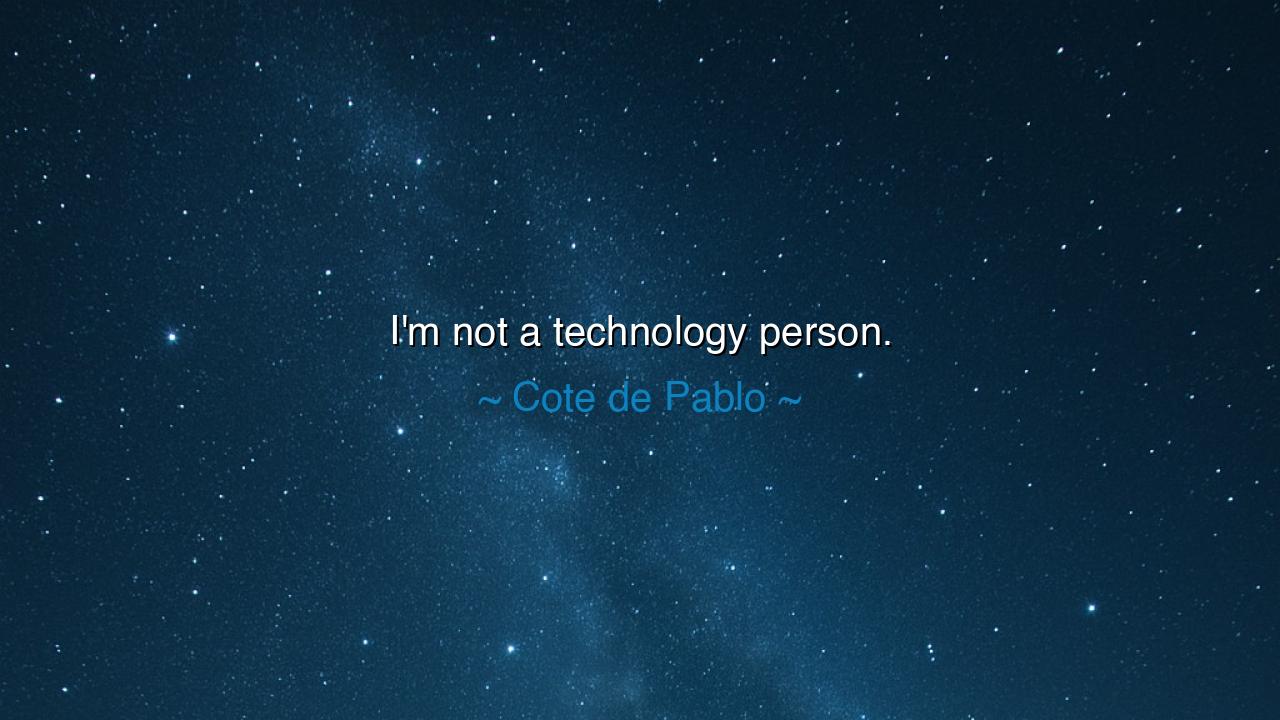
I'm not a technology person.






Cote de Pablo, the actress whose art lives in expression rather than circuitry, once confessed with simplicity: “I’m not a technology person.” At first hearing, these words may seem light, almost casual, yet they conceal a profound truth about the human spirit and its relationship with the tools of its age. For in a world increasingly dominated by machines and screens, to say “I am not of this realm” is to claim a certain clarity—that life is not only about the mastery of devices, but about the mastery of self, of heart, of presence.
When she declares herself “not a technology person,” de Pablo reveals that her essence is tied not to wires and codes, but to the timeless art of human connection. As an actress, her craft is the ancient one: the telling of stories, the embodiment of characters, the stirring of emotion in the hearts of others. These things cannot be digitized, nor can they be reduced to mere algorithms. They belong to the realm of human soul, not machine logic. Her words remind us that not all greatness must come through technology—there are gifts older, deeper, and no less powerful.
Consider the story of Socrates, who refused to write down his teachings. Though writing was the “technology” of his age, he believed wisdom should live in dialogue, in the fire of spoken word between teacher and student. In a sense, he too was “not a technology person,” yet his refusal did not make him less influential. Rather, it anchored his philosophy in living interaction, in the very fabric of human encounter. Cote de Pablo’s statement carries this same echo: that life and art can thrive without leaning heavily on the latest tools.
Yet her words are not an outright rejection of technology, but a declaration of identity. For some, machines are a calling; for others, they are merely instruments at the edges of life. Just as the farmer trusts the soil more than the plow, and the singer trusts the breath more than the microphone, de Pablo trusts the raw, unmediated power of performance over the devices that surround it. Her focus is not on the tool, but on the truth that passes through it. And that, in itself, is wisdom.
History teaches us that humanity has always been divided between those who build the tools and those who wield other forms of power. Leonardo da Vinci invented machines, but Shakespeare wielded words. Tesla bent electricity to his will, but Gandhi bent nations with the strength of his spirit. One was a “technology person”; the other, not. Yet both changed the course of history. Thus, de Pablo’s statement is not weakness—it is alignment with a lineage of souls who changed the world without needing to master every tool of their time.
The lesson here is powerful: you need not master every tool to live a life of meaning. You may not be a “technology person,” but you can still be a person of wisdom, of courage, of love, of art. The measure of a life is not in the devices one commands, but in the light one brings to others. If technology aids you, use it. If it does not, do not despair. What matters is to find your gift, cultivate it, and offer it to the world.
Therefore, I counsel you: do not be ashamed if you are not skilled in every innovation. Do not think yourself less if others move faster through the world of machines. Instead, ask yourself: what do I carry that technology cannot? Is it kindness? Is it creativity? Is it presence? Build that gift, and the world will have something greater than any invention.
So let Cote de Pablo’s words endure as a reminder: “I’m not a technology person.” To speak them is not to confess failure, but to affirm a different kind of strength. For while machines may grow faster and smarter, the human heart still beats with truths that no device can replace. Let us honor those truths, and remember always: technology is a tool, but humanity is the treasure.






AAdministratorAdministrator
Welcome, honored guests. Please leave a comment, we will respond soon